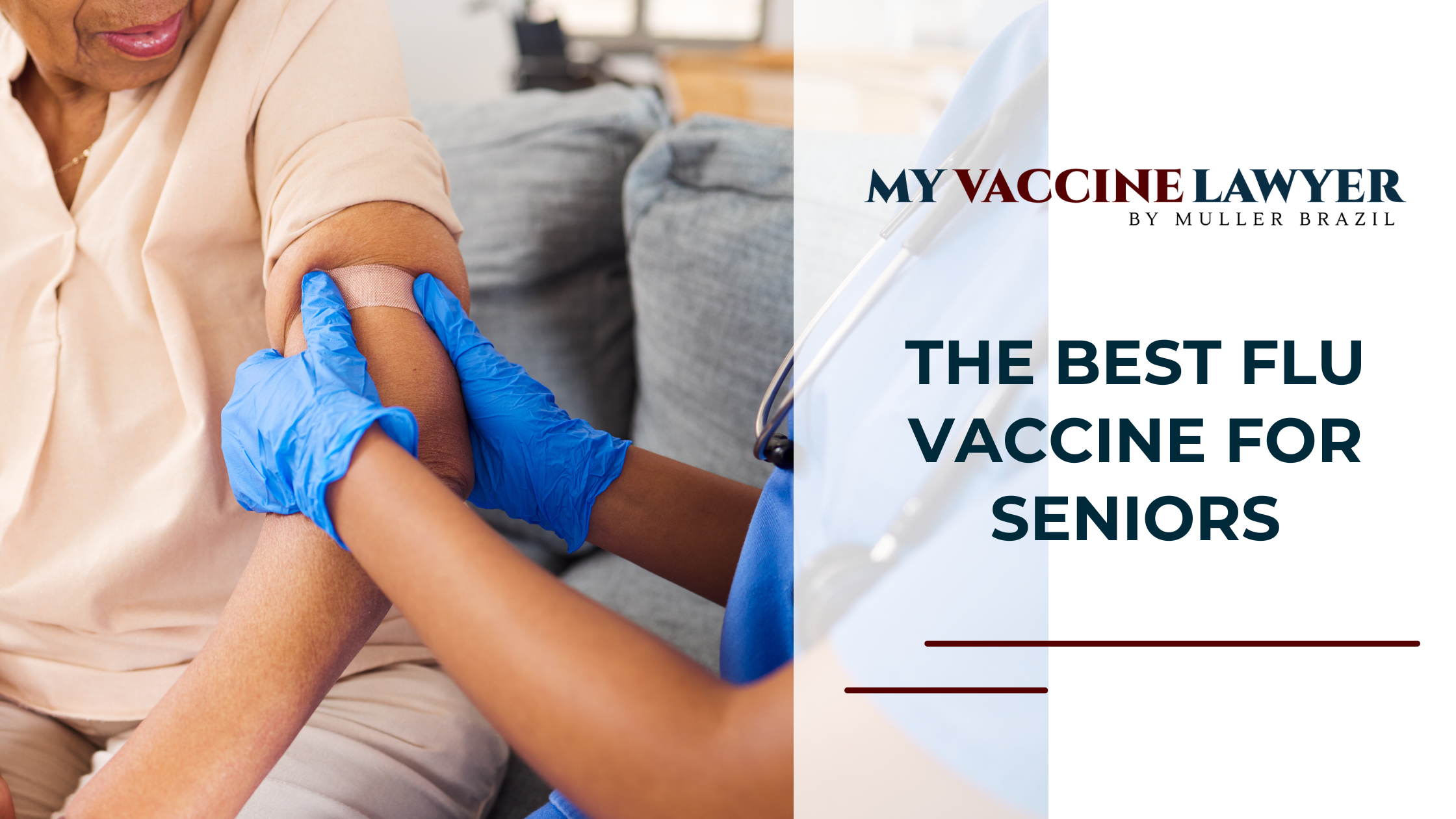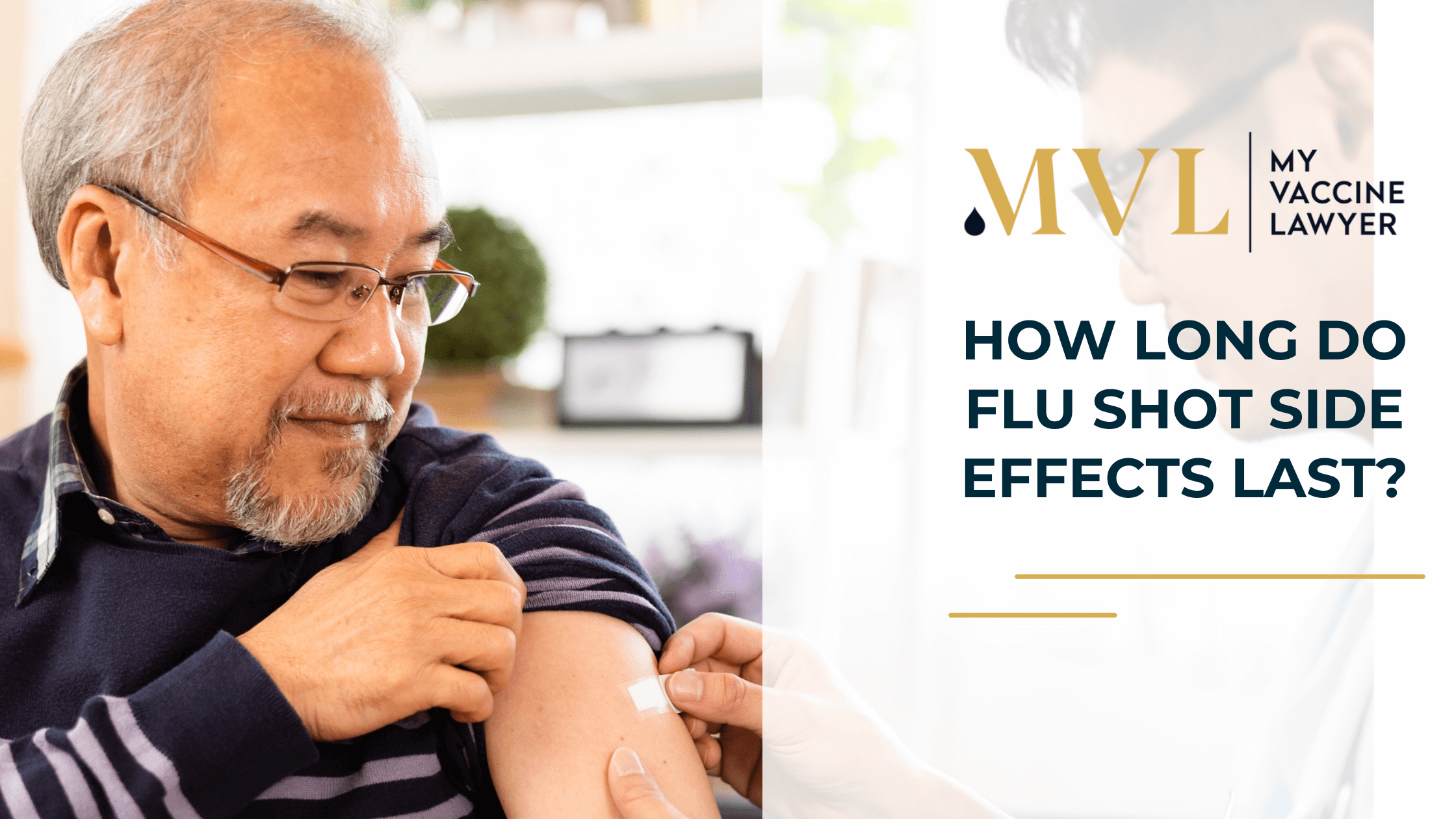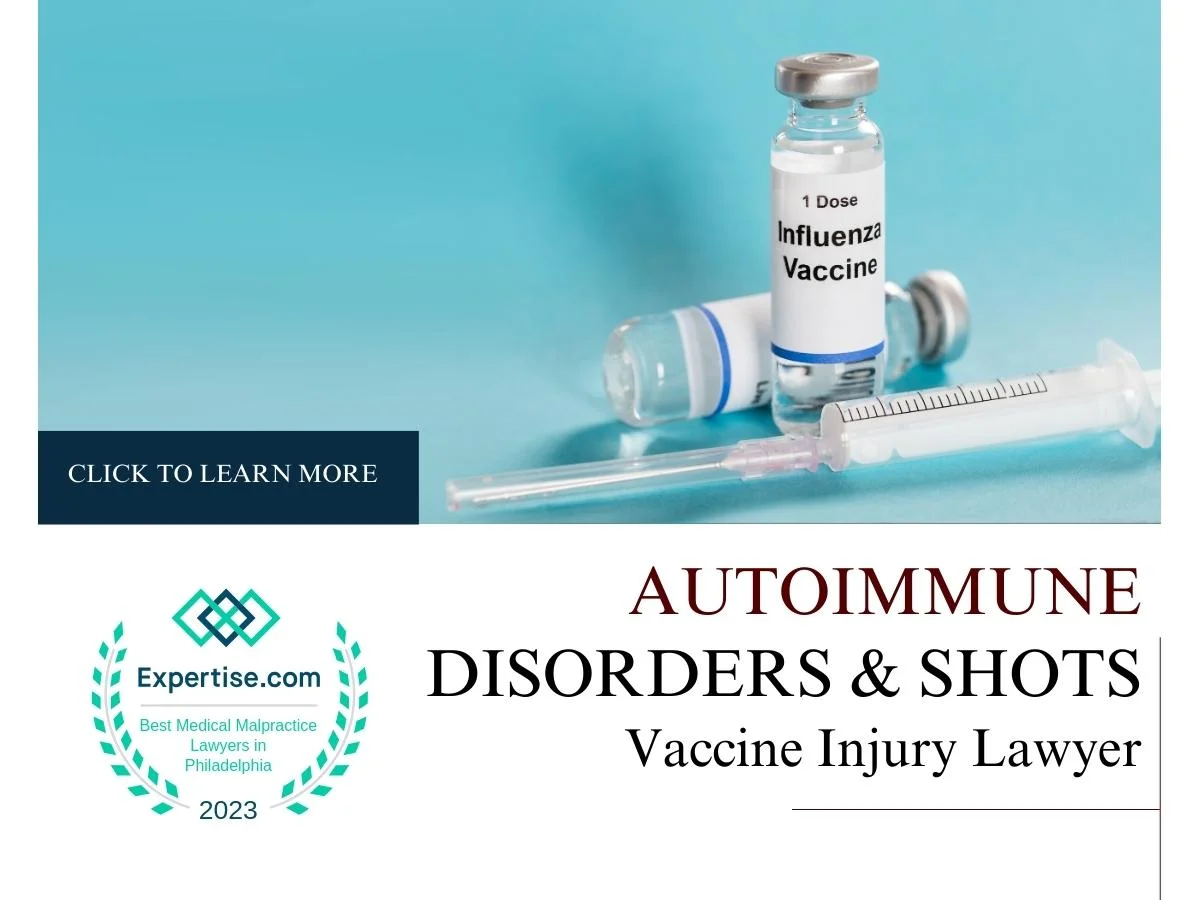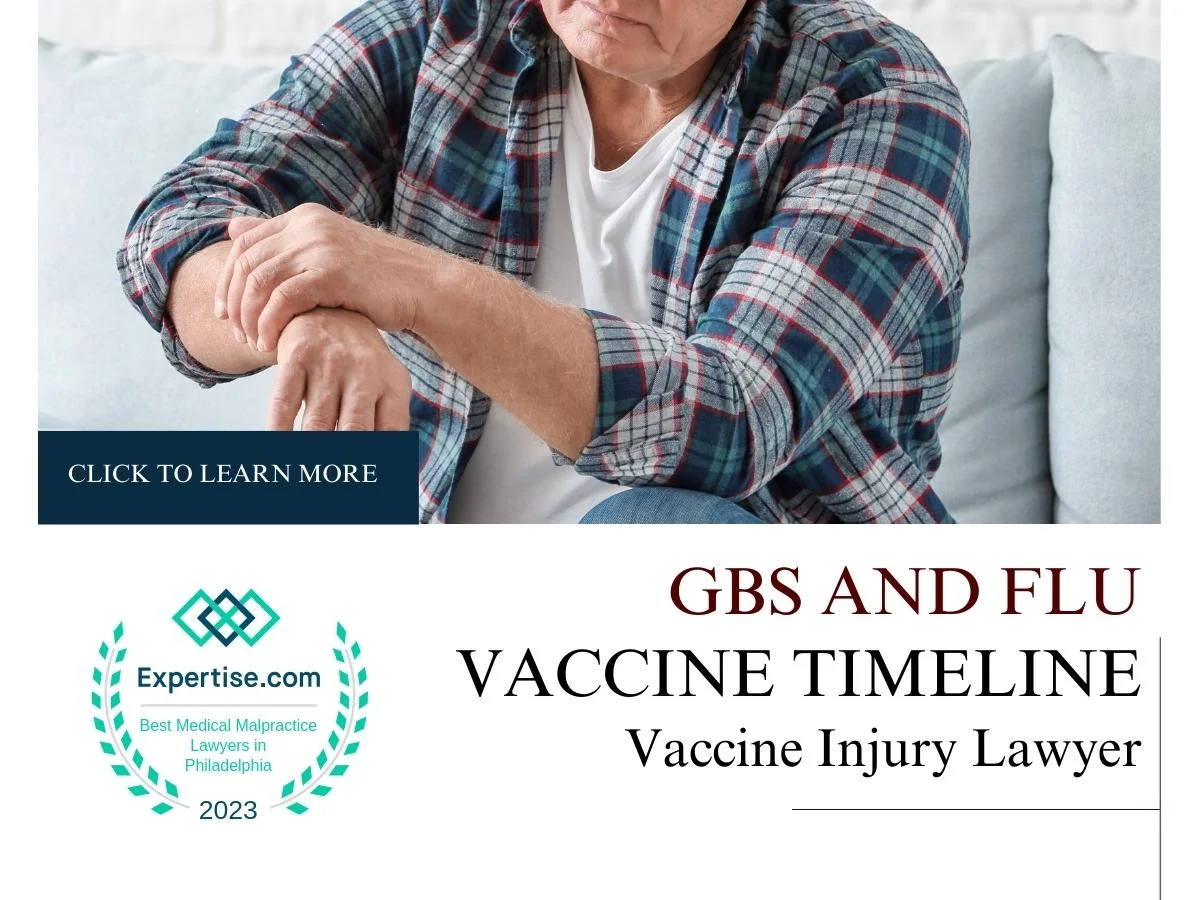The Best Flu Vaccine for Seniors
Vaccines have a powerful role in protecting against dangerous diseases, especially for older adults and individuals at high risk.
7 min read
Vaccine Injury Law Resources / Flu Shot / How Long After Flu Shot Does Guillain-Barré Syndrome Develop?
 Paul Brazil
:
Jan 29, 2024 1:58:13 PM
Paul Brazil
:
Jan 29, 2024 1:58:13 PM
Clear timelines, early signs, increased risk patterns and what Guillain-Barré Syndrome looks like after influenza vaccination.
Guillain-Barré Syndrome can develop within days to several weeks after a flu shot, and that timing drives every evaluation involving the influenza vaccine, seasonal influenza vaccination and vaccine injury claims. Most epidemiologic evidence places onset between 3 days and 6 weeks, with a clear peak around 10–21 days, a period repeatedly identified across flu seasons where increased risk is most visible.
Weakness, tingling or rapid changes in the peripheral nerves during this window raise the question of Guillain-Barré Syndrome GBS, especially when no preceding infection or influenza-like illness explains the symptoms. This pattern appears in observational studies involving the seasonal influenza vaccine, pandemic vaccines, HPV vaccine and other vaccines where autoimmune response is suspected. Each case develops differently, yet the temporal association becomes the single strongest marker when examining potential adverse events or determining whether symptoms align with Guillain-Barré development.
Most Guillain-Barré cases linked to flu vaccination emerge within a narrow, repeatable window.
This window is central to vaccine injury claims, clinical diagnosis and legal review.
3 days → 6 weeks
This is the timeframe documented across epidemiologic evidence, observational studies and VICP petition data.
Day 10–21: the most common period for GBS development
1–2 GBS cases per million vaccinations: estimated risk reported across multiple flu seasons
Similar attributable risk: seen in analyses of the seasonal influenza vaccine, influenza vaccination and pandemic vaccines
These numbers reflect a small risk, not a theoretical one. They shape how attorneys evaluate whether a temporal association supports the onset of Guillain-Barré Syndrome after a flu shot.
Take Control of Your Injury Today
Influenza infection can cause Guillain-Barré Syndrome on its own, which is why attorneys examine whether a patient experienced influenza-like illness before the flu shot or only after symptoms began. This detail separates coincidence from a pattern that may qualify as a vaccine injury.
If weakness or tingling begins after the flu vaccine and no infection is documented beforehand, the onset aligns more closely with cases reviewed under the VICP. When an infection is confirmed first, attorneys assess whether the timing makes infection the more likely trigger. The goal is not to exclude vaccination but to determine which sequence of events fits the medical records.
The timeframe aligns with how the immune system reacts to the influenza virus or the seasonal vaccines designed to prevent it. When symptoms: tingling, weakness, difficulty walking, fall inside this range without a clear preceding infection, attorneys examine whether the pattern reflects increased risk of GBS associated with the flu shot or other adverse events documented in similar claims.
A shift in sensation is often the first signal of Guillain-Barré Syndrome, and it begins quietly. Tingling in the feet. A tightening in the calves. A moment of imbalance that feels out of place after flu vaccination.
These early changes reflect how the peripheral nerves start to misfire.
And unlike typical adverse effects from seasonal vaccines, they move.
A patient notices numbness rising from the ankles within a few days.
Another feels unexpected heaviness in both thighs after walking across a room.
A third experiences rapid muscle weakness when standing, despite no preceding infection or influenza-like illness.
Each example aligns with the pattern of neurological complications documented in Guillain-Barré cases following the seasonal influenza vaccine, the influenza vaccine, or other vaccines studied in large observational groups.
GBS disrupts the nerve cells that carry movement and sensation. Early findings often include:
symmetrical weakness
tingling spreading upward
reduced reflexes
difficulty walking
In severe cases, this progression continues to the arms or chest, sometimes causing difficulty breathing, which requires urgent care and may lead to early GBS admission.
This pathway differs sharply from typical vaccine adverse events, which fade with time. When weakness increases, spreads, or interferes with daily movement, clinicians evaluate for Guillain-Barré Syndrome GBS using examinations designed specifically to identify nerve involvement.
These symptoms can appear a few weeks after the flu shot, supporting the same risk of GBS following vaccination reported in epidemiologic data. Some cases have been noted after HPV vaccination and other vaccines as well, but influenza remains the most studied because of its long history and the size of national influenza immunization programs.
When these signs develop inside the recognized onset window, they form part of the medical basis used in vaccine injury evaluation, particularly when no other illness explains the progression
Some cases of Guillain-Barré Syndrome appear after influenza vaccination, and the explanation begins with how the immune system responds to seasonal vaccines. The immune response designed to target influenza virus proteins occasionally affects the peripheral nerves, creating the pattern seen in Guillain-Barré.
Two findings appear consistently across observational studies and broader epidemiologic evidence:
1. The exact cause remains uncertain.
GBS involves immune activity directed at components of the nerve, yet no single mechanism explains every case. Some patients experienced a preceding infection, others did not. Some received a seasonal influenza vaccine, others the first dose of a pandemic formulation or other vaccines such as the HPV vaccine.
2. A small subset reflects autoimmune involvement.
The pattern matches autoimmune diseases where the body misidentifies nerve structures, particularly when symptoms fall inside the same timeframe used in clinical and legal evaluation.
Across flu seasons, researchers note fluctuations in relative risk, with some seasonal vaccines showing no significant association and others showing a slight increase in GBS cases. Public health records categorize the overall relationship as a small risk, yet a recognized one, especially when GBS development coincides with a timeframe linked to risk of GBS following the flu shot rather than a preceding illness.
These findings do not determine causation individually. They shape how clinicians interpret onset and how attorneys assess whether the presentation aligns with patterns seen in compensated claims.
A Guillain-Barré case enters the VICP review process when symptoms develop within the recognized onset window and follow a progression consistent with vaccine-related neurological involvement. The timing is central, but timing alone is not enough. Attorneys examine several markers that determine whether a claim reflects the risk of GBS following flu vaccination rather than another cause.
This range aligns with patterns identified in disease control reports, national surveillance programs and the national influenza immunization program. GBS development outside this range weakens a claim unless supported by additional medical evidence.
Weakness spreading from the legs upward, reduced reflexes and sensory changes form the baseline pattern. These findings differ from transient adverse effects sometimes seen after vaccination and point toward disruption of the peripheral nerves rather than routine post-shot soreness.
A preceding infection, surgical procedures or unrelated autoimmune conditions may complicate review. Attorneys examine how GBS compared to the background incidence in that flu season and whether the progression supports a temporal association with the influenza vaccine.
Neurologist examinations, nerve conduction studies, MRIs, lumbar puncture results and early healthcare provider notes create the evidence trail used in vaccine injury determinations. These records establish how quickly symptoms moved and whether they fit recognized GBS cases.
Attorneys compare the presentation to epidemiologic evidence from similar flu seasons and evaluate whether the symptoms follow a pattern seen in prior compensated claims. They assess how GBS patients progressed, how timing aligned with influenza vaccination and whether the case reflects potential risks acknowledged in public health data.
This review transforms clinical notes into a structured legal argument, a necessary step because VICP requires proof that the injury follows a pattern recognized across prior vaccine injury claims, not just a diagnosis.
Take Control of Your Injury Today
A Guillain-Barré case becomes legally viable only when the medical record, onset timeline and neurologic findings line up with patterns recognized in prior vaccine injury claims.
GBS appearing within 3–42 days of flu vaccination carries legal significance because this range mirrors the attributable risk window documented across million vaccinations in seasonal programs. Attorneys examine whether the patient experienced upward progression, sensory changes or muscle involvement in a pattern consistent with causing muscle weakness seen in Guillain-Barré cases.
Talk to one of our specialized vaccine injury lawyers to see whether you qualify for a VICP claim.
Neurologist notes, nerve conduction results and early symptoms guide the legal analysis. When nerve cells show impaired function on testing or when reflex loss and ascending weakness are noted by a healthcare provider, attorneys compare the findings to GBS patients documented in vaccine-related petitions.
This evaluation identifies whether the injury reflects an immune-driven process rather than complications tied to preceding infection, surgical procedures or unrelated autoimmune diseases.
The VICP requires more than a diagnosis. It requires proof that the case fits a legally recognized pattern of risk of GBS following vaccination. Attorneys use epidemiologic context, including relative risk from flu-season surveillance and comparisons to seasonal vaccines and other vaccines like the HPV vaccine. We identify whether the clinical presentation matches patterns seen in compensated claims and demonstrate why this case fits within the accepted framework.
A structured legal argument transforms medical records into a claim. Without it, even strong temporal associations fail to meet the program’s threshold.
When Guillain-Barré develops within weeks of influenza vaccination, timing becomes critical. My Vaccine Lawyer prepares claims grounded in medical records and onset analysis.
Contact us today for your free consultation
An evaluation becomes worthwhile when weakness or sensory changes appear within the recognized post-vaccination onset window, because that timing helps attorneys determine whether the pattern aligns with a documented causal association or another source of injury such as infection.
Records noting the date of the flu vaccine, early neurological findings, hospital evaluations and specialist notes help clarify the GBS risk timeline and allow attorneys to assess whether the progression fits a recognizable pattern seen in prior compensated claims.
Yes. Compensation depends on whether the clinical progression matches established criteria for vaccine injury review. Even when the exact cause is not identified, a well-documented onset can support a claim if it aligns with the known timeframe associated with developing GBS after vaccination.
It can. Years showing a slightly increased risk in surveillance data give additional context for attorneys comparing the patient’s onset to broader reporting trends, especially when the timing coincides with known patterns following flu vaccine administration.
Attorneys examine how the presentation compares to published causes of Guillain-Barré Syndrome, whether symptoms fall into the accepted onset window, and how the progression fits patterns used to evaluate GBS risk in prior claims reviewed under the VICP.
Paul Brazil is a native of Dunmore, Pennsylvania and a graduate of Dunmore High School. For his undergraduate education, he attended Bloomsburg University where he majored in political science. He then went on to earn his JD from Widener University School of Law. Following graduation from law school, Mr. Brazil worked at a large Philadelphia civil defense firm where he litigated workers’ compensation claims and Heart and Lung Act cases. In 2012, he joined with his coworker Max Muller to form Muller Brazil.
Paul Brazil is a native of Dunmore, Pennsylvania and a graduate of Dunmore High School. For his undergraduate education, he attended Bloomsburg University where he majored in political science. He then went on to earn his JD from Widener University School of Law. Following graduation from law school, Mr. Brazil worked at a large Philadelphia civil defense firm where he litigated workers’ compensation claims and Heart and Lung Act cases. In 2012, he joined with his coworker Max Muller to form Muller Brazil.

Vaccines have a powerful role in protecting against dangerous diseases, especially for older adults and individuals at high risk.

Still experiencing shoulder pain after a flu shot? Prolonged discomfort or loss of motion after a flu vaccination can resemble patterns seen in...

Being diagnosed with an autoimmune disorder after a flu shot, you may be eligible for compensation through the National Vaccine Injury Compensation...
